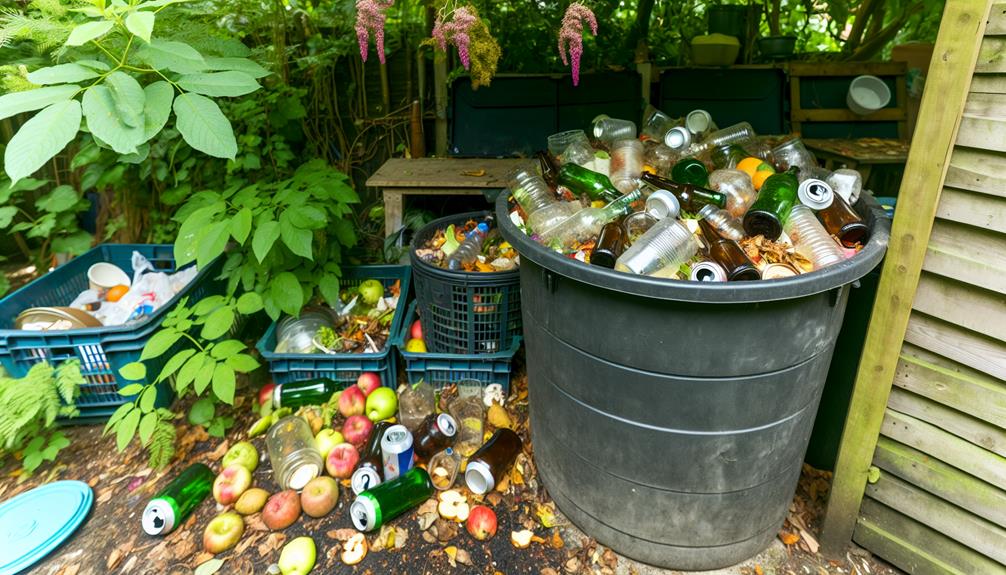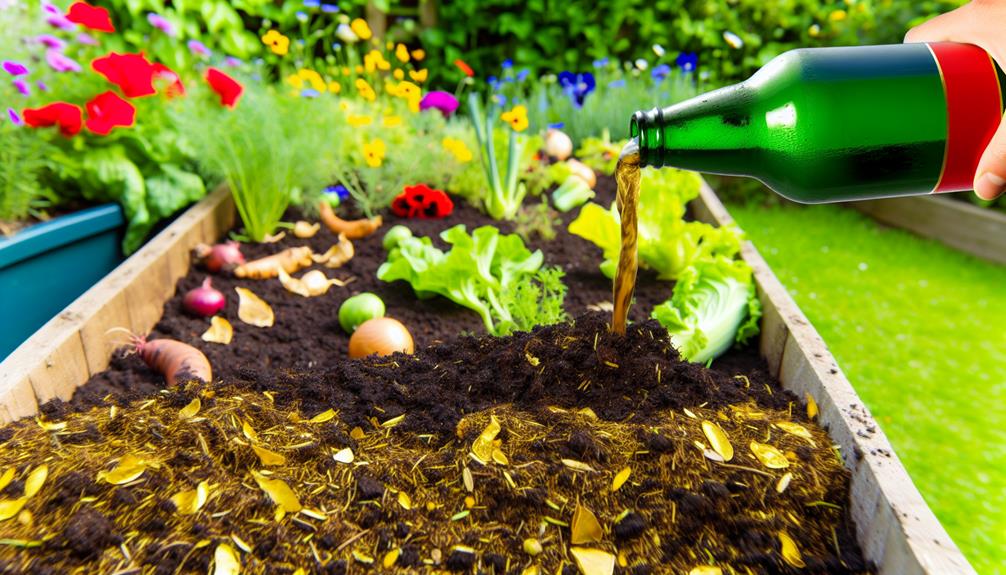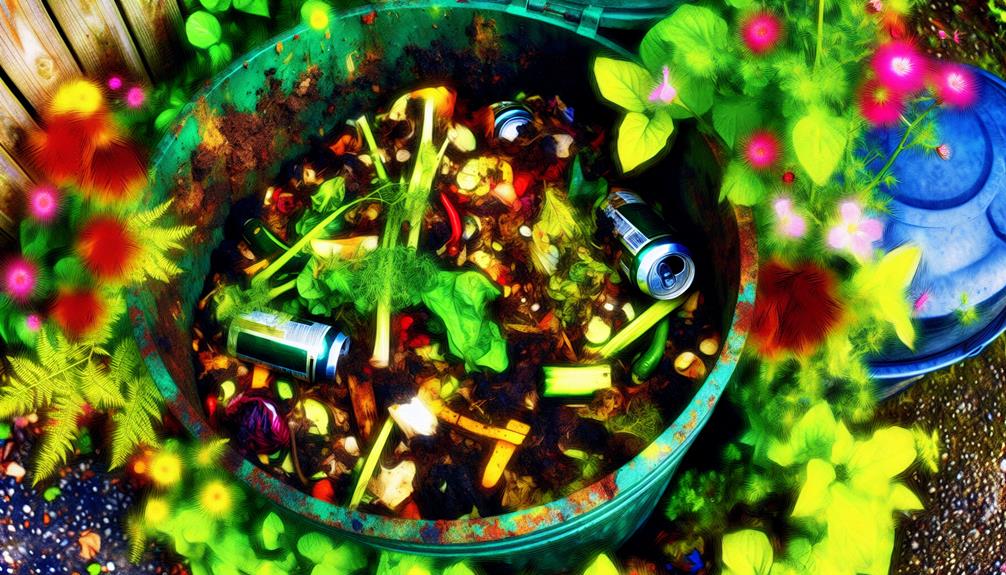

Yes, you can compost beer, and it’s a fantastic way to boost your compost pile! Beer contains sugars and yeast that help beneficial microbes thrive, speeding up decomposition and enhancing nutrient distribution. It’s loaded with trace minerals that enrich the soil.
Just be sure to pour it in small amounts to maintain balance and avoid odors. Turn your compost regularly to keep it aerated and guarantee it stays as moist as a damp sponge. By composting beer, you’re not only reducing waste but also creating richer, more fertile soil. Want to make your compost pile even better? Keep exploring these tips!
Beer is crafted from four key ingredients: water, malted barley, hops, and yeast. Water forms the base, making up most of the brew.
Malted barley, a grain, provides the sugars needed for fermentation and gives beer its body and sweetness. Hops, the flowers of the hop plant, add bitterness to balance the malt’s sweetness and contribute unique aromas and flavors.
Yeast, a microorganism, is essential as it ferments the sugars, producing alcohol and carbonation. These ingredients come together through a fascinating process of brewing, transforming simple components into diverse and flavorful beverages.
Knowing what beer is made of helps you appreciate the artistry behind each pint, fostering a deeper connection with this beloved drink.
Also Read: Can You Compost Passion Fruit?
When enjoying your favorite brew, you’re also consuming a variety of nutrients that contribute to your overall diet. Beer contains essential vitamins like B6, niacin, and folate, which help support your metabolism and overall energy levels.

Additionally, it provides minerals such as magnesium, potassium, and phosphorus, necessary for maintaining healthy bodily functions. The barley and hops in beer offer antioxidants, which can help in reducing oxidative stress in your body.
Plus, beer has small amounts of protein and fiber, aiding in digestion and overall nutrient absorption. While moderation is key, these nutrients make beer more than just an invigorating drink.
Also Read: Can You Compost Wooden Toothpicks?
Understanding the interaction between beer and compost chemistry can reveal new ways to enrich your compost pile with essential nutrients. Beer contains sugars and yeast, which can accelerate the decomposition process. When you add beer to your compost, it helps create an environment where microorganisms thrive, breaking down organic material more efficiently.
Here’s how beer can impact your compost chemistry:
When you compost beer, you’re not just getting rid of waste; you’re boosting your garden’s soil fertility with valuable nutrients. This process also helps reduce the environmental impact of food and beverage waste, making it a win-win for your garden and the planet.
Ready to learn how composting beer can transform your compost pile into a powerhouse for plant growth?
Adding beer to your compost can dramatically boost soil fertility by introducing essential nutrients and beneficial microorganisms. Beer is rich in nitrogen, which is a critical component for plant growth. When you add beer, you’re enhancing your compost’s ability to nourish your garden.
Here’s what you gain:
In addition to enhancing soil fertility, composting beer greatly reduces waste impact by repurposing a common beverage. When you compost beer, you’re not just tossing it away; you’re giving it a new life. This process helps divert liquid waste from landfills, reducing overall waste and its environmental footprint.
Imagine the difference we could make together—less waste means a cleaner planet for everyone. Plus, you’re joining a community of eco-conscious individuals who care deeply about sustainability. By composting beer, you contribute to a shared goal of waste reduction. It’s a chance to connect with others who value the environment, making each step towards a greener future more meaningful.
One potential drawback of composting beer is the risk of attracting pests and unwanted wildlife to your compost pile. By adding beer, you might inadvertently invite critters like rats, raccoons, and insects, which can disrupt the composting process.
Some other concerns include:
Understanding these potential issues can help you make better composting decisions and maintain a healthy, active pile.
Also Read: Can You Compost Yarn?
Combining beer with other organic materials in your compost pile can enhance nutrient diversity and boost microbial activity. By mixing beer with various compostable items, you create a richer environment for decomposition.
Here are some materials you can combine with beer:
When you mix beer with these materials, you’re not just recycling waste; you’re fostering a thriving ecosystem in your compost pile. This combination promotes a well-rounded, nutrient-packed compost for your garden.
To get your compost pile just right, you’ll need to balance green and brown materials. Greens like vegetable scraps and beer add nitrogen, while browns like leaves and paper add carbon.

Maintain proper moisture by keeping your pile moist but not soggy. Turning the compost regularly is also essential. Turn it every few weeks to keep air flowing, speeding up the composting process.
Achieving the perfect balance between green and brown materials is crucial for successful composting. Green materials, like vegetable scraps and coffee grounds, provide nitrogen, while brown materials, like dry leaves and cardboard, supply carbon. This balance guarantees your compost pile breaks down effectively and avoids unpleasant odors.
For a successful compost, aim for a ratio of about 2 parts brown to 1 part green.
Green materials:
Brown materials:
You’ll know you’ve got it right when your compost pile feels warm and looks dark and crumbly.
Also Read: Can You Compost Yogurt?
Maintaining your compost pile properly moist is just as crucial as balancing green and brown materials. Moisture helps microorganisms break down organic matter, accelerating the composting process.
Aim for a damp sponge consistency—neither too dry nor too wet. If your pile feels dry, sprinkle it with water or add moisture-rich materials like fruit scraps or, yes, even leftover beer. On the flip side, if it’s too soggy, mix in more brown materials like straw or cardboard to absorb excess moisture.
Checking your compost regularly ensures it stays in the sweet spot, promoting a healthy, thriving compost community. By upholding proper moisture, you’re helping create rich, fertile compost that benefits your garden and the environment.
Rotating your compost regularly guarantees even decomposition and prevents unpleasant odors. By turning the pile, you introduce oxygen, which aerobic microbes need to break down materials efficiently. This process also helps manage moisture levels, making sure that your compost doesn’t become too wet or too dry.
Here are some benefits of regular turning:
One common mistake people make when composting beer is adding too much at once, which can disrupt the balance of the compost pile. When you pour large amounts of beer, it can create a soggy, smelly mess that attracts pests. Instead, add beer in small, manageable quantities.
Another mistake is forgetting to mix the beer into the compost. If you just pour it on top, it won’t distribute evenly, leading to uneven decomposition.
Also, avoid adding beer that’s gone bad or is moldy, as it can introduce harmful bacteria.
Lastly, remember that beer is a green material, rich in nitrogen, so balance it with brown materials like leaves or paper for best composting results. By avoiding these mistakes, you’ll maintain a healthy, thriving compost pile.
Composting beer isn’t only possible but also beneficial for your compost pile! By adding beer, you’re enriching the compost with essential nutrients and promoting faster decomposition.
Just remember to balance it with other materials to maintain a healthy compost mix. So, don’t let leftover beer go to waste—turn it into rich, organic fertilizer for your garden.
Embrace this eco-friendly practice and watch your compost thrive!
